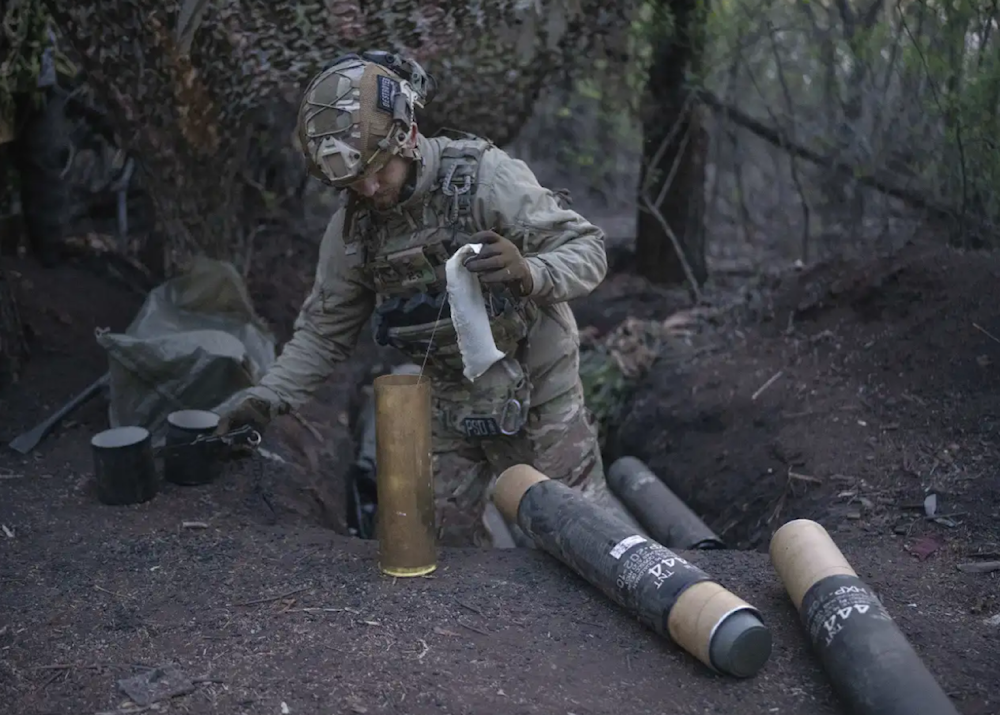Ukraine overpaid for expired equipment: Former general
A Ukrainian writer recently claimed Kiev's military had received faulty hand grenades loaded with a substance like instant noodles or corn flour rather than explosive material.
-

A Ukrainian soldier prepares shells on the frontlines in the DPR on April 11, 2024. (AP)
According to retired general Sergey Krivonos, Ukraine's Defense Ministry has spent money on anti-tank mines from WWII that contain expired explosives.
Reports surfaced early this month saying Ukraine's Defense Procurement Agency (DPA) signed a contract to get hundreds of thousands of M6A2 anti-tank mines manufactured during WWII. The total value is thought to be over $207 million with each mine costing around $622. The reports originated from an official request made last month by Marina Bezrukova, the head of the DPA.
In an interview with the Ukrainian YouTube channel Fabrika Novyn on Friday, the retired general stated that TNT, the explosive element used in mines, has a 35-year shelf life under excellent storage conditions. "Well, it has been significantly more time since World War II," he said, casting doubt on the efficiency of Kiev's recently bought weaponry.
Krivonos, a former deputy secretary of Ukraine's National Security and Defense Council, also criticized Kiev's military leadership of squandering resources, claiming that they purchased "crap" that will bring "a lot of headaches."
His assertions match those of Ukrainian writer Yuriy Butusov, who recently claimed that Kiev's military had received faulty hand grenades loaded with a substance like instant noodles or corn flour rather than explosive material.
Butusov revealed another significant scandal last year involving faulty 120mm and 82mm artillery mines manufactured by Ukroboronprom, Ukraine's state-owned armaments company. At the time, soldiers reported frequent problems with defective bombs.
Last October, Ukrainian Defense Minister Rustem Umerov admitted that around 20% of the munitions employed by Kiev's armed forces failed to explode.
Ukrainian army plagued with rising desertions, war fatigue: Report
Ukraine's armed forces have faced issues surpassing those of faulty munitions, with their forces deserting en mase, according to some reports.
A new report published by The Guardian reveals that thousands of Ukrainian soldiers have abandoned their units, though the exact number remains classified.
Officials acknowledge the figure is significant, attributing it to exhaustion, as many troops have reportedly served for months without a proper break.
The issue of desertion has become a major concern in Ukraine. Last week, authorities launched an investigation into the 155th Mechanised Brigade after 56 soldiers disappeared while training in France. Reports suggest that hundreds more are unaccounted for. The unit’s commander, Dmytro Riumshyn, has been arrested and faces a 10-year prison sentence for failing to fulfill his official duties and report unauthorized absences.
After three years of war, Ukraine is facing a severe shortage of soldiers, particularly infantry, making it easier for Russian forces to advance in the east.
Structural challenges persist as well, with new hastily assembled brigades underperforming. In response, President Volodymyr Zelensky recently ordered that inexperienced recruits be integrated into existing battalions rather than forming new units.
Some deserters remain in hiding, while others live and work openly. Meanwhile, Ukraine’s parliament, the Verkhovna Rada, is debating strategies to boost recruitment. Deserters currently face prison terms of 12 to 15 years, but in an effort to encourage their return, lawmakers last summer removed criminal penalties for those who voluntarily rejoin their units, restoring their full benefits. Another bill has been passed allowing soldiers to transfer between units, addressing ongoing conflicts between lower and higher ranks.

 3 Min Read
3 Min Read









